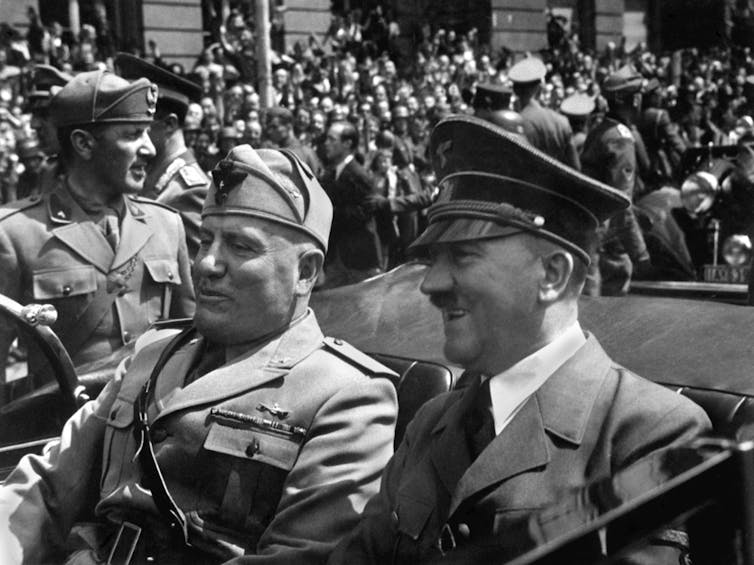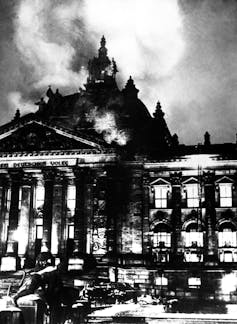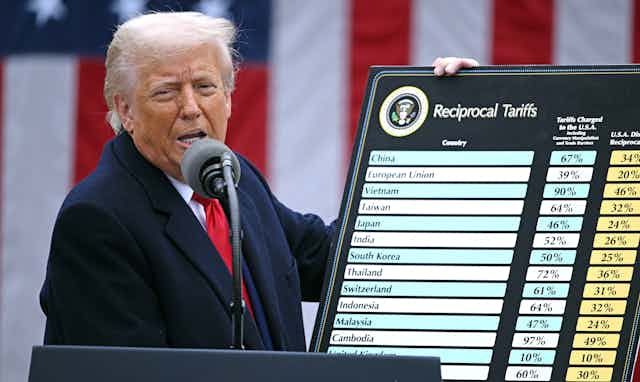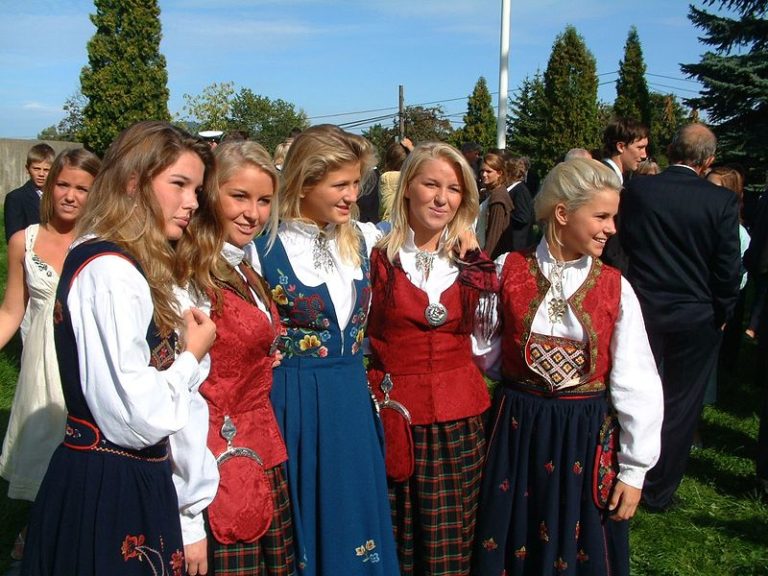
Aristotle Kallis, Keele University
UK Prime Minister Boris Johnson’s recent prorogation of parliament has led many to fear that parliamentary democracy in Britain is unravelling. And now the High Court has ruled that Johnson acted lawfully in suspending it. But whichever side of the political divide you are on, history – particularly from the 1930s – has some instructive lessons about the dangers of sidelining parliament, however frustrating its processes can be, and moving towards a more direct form of government.
Adolf Hitler made no attempt to disguise his disdain for liberalism and his fanatical opposition to the Weimar Republic’s parliamentary system. In 1924, when a coalition of radical right-wing parties decided to take part in the parliamentary elections against his wishes, he confided that he was now ready to “hold his nose” and enter the parliamentary game.
Hitler added, however, that “participation has to be seen as one of many methods of combating the present system … [it] should not be ‘positive cooperation’ … but only be through the fiercest opposition and obstructions”.
Hostility to the institutions of liberal parliamentary democracy ran deep in Europe over the years between the two world wars. The fact that a democratic wave swept away old empires, such as Austro-Hungary, and authoritarian regimes, such as Germany’s, after 1918, proved in hindsight to be a Pyrrhic victory for liberal democracy.
Liberal parliamentary rule was new, unfamiliar, and hastily implemented in many countries, including Germany and a series of new nations, such as Yugoslavia, Hungary and Poland. On many occasions, it lacked both elite and popular support. It was viewed as alien to the traditions of the country or, even worse, imposed against the will of “the people” with the support of shadowy foreign powers.
That fierce and widespread opposition to parliamentary democracy had to wait until the 1930s did not mean that the deeper roots of hostility had not been in place from the beginning. Such opposition extended well beyond the usual suspects of the radical nationalist right or the revolutionary left. It included traditional social institutions, such as the military and the church, authoritarian political constituencies, and even conservative and liberal elites.
Most of them had gone along with the liberal democratic stream in the 1920s, in the absence of any viable political alternative and in fear of a far worse revolutionary scenario. Yet as societies were plunged into crisis and deep polarisation, especially after the global economic meltdown of 1929, many of them felt more and more disinclined to keep up appearances anymore.
The widespread rejection of parliamentary democracy in the 1930s was justified and defended on numerous grounds: that parliaments were slow and ineffective in decision-making; that they promoted national disunity and political polarisation; that they were a foreign custom foisted on societies with very different traditions, and so on.
On the eve of World War II, parliamentary democracy seemed broken and in rapid, irreversible retreat, especially in southern, central, and Eastern Europe. The rise of fascism in Germany and Italy was just the most visible symbol of this trend.
Such ill will towards the institutions of parliamentary democracy betrayed a much deeper and stronger preference for strong, unaccountable government, particularly in the face of a “crisis”. A perceived or manufactured situation of emergency, be that economic, social or national, polarised public opinion. It also strengthened the appeal of maverick charismatic politicians such as Hitler in Germany, Benito Mussolini in Italy and Oswald Mosley in Britain, who brandished their determination to act with resolve as an antidote to alleged parliamentary inactivity. Their fondness for thinking “out of the box” resonated emotionally with the masses.
Read more:
Measles outbreaks and political crises go hand in hand
No matter how ineffective or institutionally flawed, parliaments (like courts) stood in the way of strong executive. They represented an important element of indirect representation inserted between “the people” and power that more and more elite and popular elements came to resent passionately in the interwar years.
Adjourning and destroying parliaments …
The infamous image of a burning Reichstag building in Berlin in late February 1933 represented only a potent symbolic moment in a long campaign to – directly or indirectly – discredit and undermine parliamentary rule.

Shutterstock
Nine years earlier, in 1924, a coalition government led by Mussolini faced a severe crisis when unruly fascist squads were accused of kidnapping and murdering a socialist member of parliament and fierce critic of fascism, Giacomo Matteotti.
Opposition deputies decided to register their exasperation with violent fascist practices by seceding from the chamber. Their hope was that either the senate would withdraw support from the government in a no-confidence vote, or that the king, Victor Emmanuel III, as head of state, would act in response to remove Mussolini from power.
Their move, known as the Aventine Secession, earned them lasting moral acclaim but hastened Italy’s slide towards the fascist dictatorship. The leader of the parliament “adjourned” its proceedings for six months. This move allowed Mussolini time to weather the crisis and room for manoeuvre. Meanwhile, the king did not intervene and senators voted in favour of Mussolini’s government, more fearful about a potential political and social crisis than about the integrity of the liberal constitutional order.
The result was that, by January 1925, Mussolini felt powerful enough to dissolve the parliament and proclaim a dictatorship. In the years leading up to World War II, a rapidly growing band of fascist and authoritarian dictators first discredited and then moved to suppress parliamentary institutions as their principal obstacle to power.
Not many – and definitely not enough – tears were shed for the demise of parliamentary democracy then. The unloved liberal parliament vanished from large parts of the world, crushed by the fiction of strong, unimpeded government and of the direct expression of the will of “the people” through its leadership without supposed intermediaries.
Lessons from the past
On the 80th anniversary of the outbreak of World War II, it is tempting to ponder how much “strong”, unaccountable governments contributed to the atmosphere of polarisation that tore interwar societies apart and plunged the world into a cataclysmic conflict.
Read more:
UK general election: when and how could it happen?
Parliaments were then, as they are now, reflections of the plurality of views in a modern society. And this plurality cannot be easily distilled into a single voice on behalf of an indivisible “people”. Parliaments were and remain institutions of hard, often frustrating negotiation and very often unpalatable compromise. They also represent an imperfect but still significant hurdle along the path that leads to abuse of power.
To even consider today, after seven decades of surprisingly stable parliamentary rule and broad consensus politics, that the threat of an authoritarian regression is exaggerated and overplayed is to forget how fragile all these copiously constructed and sustained, if essentially “boring”, checks and balances to executive power are. 1939 is painfully relevant in this respect, too.![]()
Aristotle Kallis, Professor of Modern and Contemporary History, Keele University
This article is republished from The Conversation under a Creative Commons license. Read the original article.




28 Comments
Pingback: night jazz
Pingback: แอปลดน้ำหนัก
Pingback: Sciences Diyala
Pingback: Best universities in Africa
Pingback: information
Pingback: รับทำ SEO
Pingback: namo333
Pingback: big 666 สล็อต
Pingback: sbobet mobile เดิมพันง่าย
Pingback: John Lobb
Pingback: al fakher online buy
Pingback: allylescaline hcl buy
Pingback: mkx gummies 200mg
Pingback: ทดลองเล่นสล็อต pg
Pingback: joker369
Pingback: pk789
Pingback: Mussolini yesterday, the United States today - Bergensia
Pingback: ออกแบบตกแต่งภายในคอนโด
Pingback: Tsbobet ถูกปิดมาเล่น LSM99 แทน
Pingback: ชุดกระชับสัดส่วน
Pingback: DeepBLOK ระบบสมาชิก
Pingback: nagatop situs scam
Pingback: sawan789
Pingback: เป่าฟูหลิง
Pingback: pg168
Pingback: face exercise
Pingback: โคมไฟ
Pingback: สล็อตเกาหลี